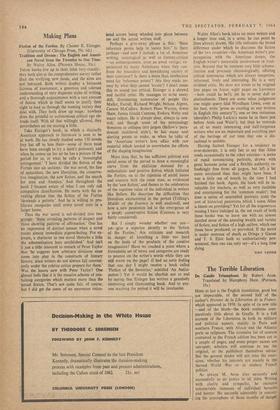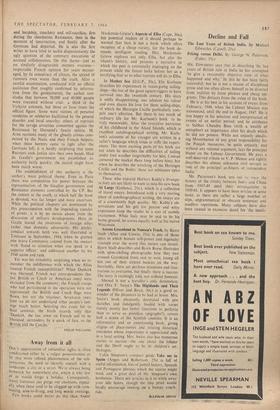The Terrible Liberation
HERE at last is the English translation, good but not impeccable, of the second half of the author's Histoire de la Liberation de la France, which appeared in 1959. In spite of its new title —and of the blurb—the book contains com- paratively little about de Gaulle. It is a full account of the Liberation in both its military and political aspects, mainly in Paris and southern France, with Alsace and the Atlantic ports as tailpieces. The extensive list of sources contained in the French edition has been cut to a couple of pages, and some proper names are mis-spelt; scholars will continue to use the original, as the publishers themselves advise. But the general reader will not miss the omis- sions, whether his interests are mainly in the Second World War or in modern French politics.
As always M. Aron tries earnestly and successfully to do justice to all sides. Writing with clarity and sympathy, he recounts innumerable instances of individual heroism and horror. He succeeds admirably in conveY- ing the atmosphere of those months of danger
and hardship, treachery and self-sacrifice, first during the clandestine Resistance, then in the moment of insurrection, and finally after the Germans had departed. He is also the first writer to have tried to tackle dispassionately the ugly question of the summary executions of accused collaborators. On this theme—just as on similarly disagreeable matters overseas— respectable French opinion for years encour- aged, by its conspiracy of silence, the spread of rumours even worse than, the truth. After a careful examination, conducted with no official assistance (but roughly confirmed by informa- tion from the gendarmerie), the author con- cludes that between 30,000 and 40,000 people were executed without trial: a third of the Vichyite estimate, but three or four times the official figure. Some were victims of personal vendettas or robberies facilitated by the general disorder and local anarchy; others of reprisals for the savage atrocities committed against the Resistance by Darnand's fascist militia. M. Aron recounts many of the ghastly crimes corn- nutted by the Nazis and their French helpers; when these horrors came to light after the Germans left, it is hardly surprising that some Resisters took justice into their own hands. Had de Gaulle's government not established its authority fairly quickly, the record might have been much worse.
The establishment of this authority is the author's main political theme. Even in Paris there was competition for power between the representatives of the Gaullist government and Resistance elements controlled by the CP. But the Contest in the south, to which half the book is devoted, was far longer and more uncertain. While the 'political chapters are dominated by this preoccupation with the impending transfer of power, it is by no means absent from the discussion of . military developments. Here de Gaulle feared the intentions of foreign allies rather than domestic adversaries, His prickly conduct towards both was well illustrated at Toulouse in SePtember, 1944, \when he greeted one brave Communist colonel from the maquis with 'Stand ,to attention when you speak to a superior officer,' and addressed another by his 1940 name and rank.
Yet was his irritability surprising when we re- member the the indifference with which the Allies treated French susceptibilities? When Dunkirk was liberated, French .war correspondents (but not British or Czech or American ones) were excluded from the ceremony; the French troops who had participated in the operation were not represented; the British and Czech flags were flown, but not the tricolour. Seventeen years later we do not understand other people's feel- ings much better. Selecting this event for its final sentence, the blurb records only that 'Dunkirk, the last town on French soil to be liberated, surrenders, by a quirk of fate, to the British and the Czechs.'
PHILIP WILLIAMS







































 Previous page
Previous page